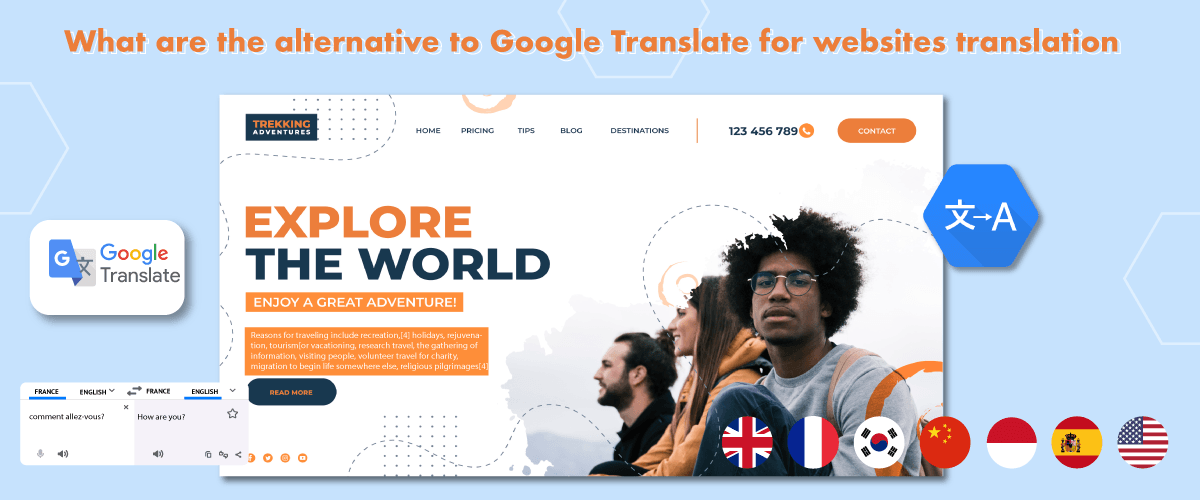Accurate website translation has become a crucial factor in expanding global reach and delivering a seamless user experience. As website developers, you understand the significance of breaking down language barriers to engage with a diverse audience.
While Google Translate might be the first tool that comes to mind, there are alternative solutions that can offer better accuracy, and customization.
Why look beyond Google Translate?

Google Translate, undoubtedly a pioneering translation tool, has its limitations. The translations provided by Google Translate can sometimes lack contextual accuracy and might not capture the nuanced meaning of content. Customization to match your brand’s tone and style can be challenging, potentially leading to an inconsistent user experience. Moreover, concerns over data privacy and security have been raised due to the nature of cloud-based translations.
Key criteria for effective website translation solutions

When considering alternatives to Google Translate, several key criteria should guide your decision:
- Accuracy: translations should accurately convey meaning while preserving context and cultural nuances.
- Customization: the ability to tailor translations to maintain your website’s voice and branding.
- SEO-friendliness: Translations need to be optimized for search engines in target languages.
- User experience: a seamless integration that ensures visitors have a smooth experience on your translated site.
- Security and privacy: ensuring that sensitive data and content are protected during the translation process.
Google Translate: advantages and disadvantages

While we are in the process of composing an article discussing substitute options for Google Translate, it remains our opinion that Google Translate stands as the most favorable translation service for the majority of users.
It boasts numerous substantial benefits:
- It boasts support for a broad spectrum of languages, surpassing the language coverage of nearly any other comparable tool. With more than 130 languages in its repertoire, the likelihood of finding the language pairing you require is quite high.
- Its translation accuracy is remarkably high. Although we will present one service that ranks above Google Translate, it is widely acknowledged that Google Translate consistently garners commendable reviews in the realm of automated translation. In essence, locating an alternative boasting superior translation accuracy proves to be a formidable task.
- The complimentary utilization of web browser and smartphone applications is at your disposal. Additionally, an API tailored for website translation is accessible with a cost-free usage tier;
- For end-users, it incorporates practical functionalities such as the capacity to interpret text embedded in images or facilitate voice-based conversations via translation.
However, a range of disadvantages exists which may lead one to consider alternative tools that are better suited for their specific circumstances:
- While Google Translate frequently maintains an impressive level of accuracy, there exist services that offer heightened precision for specific language combinations. This is particularly true in cases requiring nuanced understanding of context and local idiomatic expressions.
- Should financial constraints be a consideration and access to translation API services be necessary, there are alternatives available with more liberal cost-free usage tiers and more economical premium pricing. This notably emerges as a compelling motive to contemplate a substitute for Google Translate, as the cost associated with Google Translate places it within the higher price bracket.
8 best alternatives to Google Translate for website translation
Here are 8 recommendations for Google Translate alternatives to help translate website translations so that they become multilingual.
1. DeepL
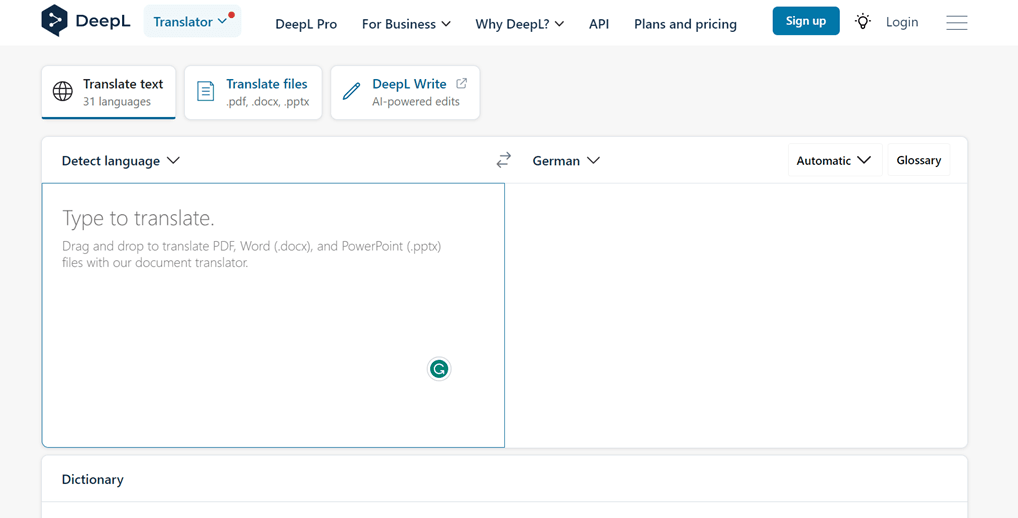
Both tools provide APIs for automated translations, catering to developers and businesses. DeepL’s interface supports translating text files like .docx or .pptx, while Google Translate remains versatile for diverse formats. Although Google Translate dominates in language variety, DeepL’s precision in complex translations often makes it the preferred choice for accuracy-focused tasks.
However, DeepL’s API comes at a higher cost, roughly 25% more than Google Translate, which may impact budget-conscious users. For those prioritizing quality, especially for European language pairs, DeepL’s context-aware translations offer a valuable advantage despite its limited language range.
2. Microsoft Translator
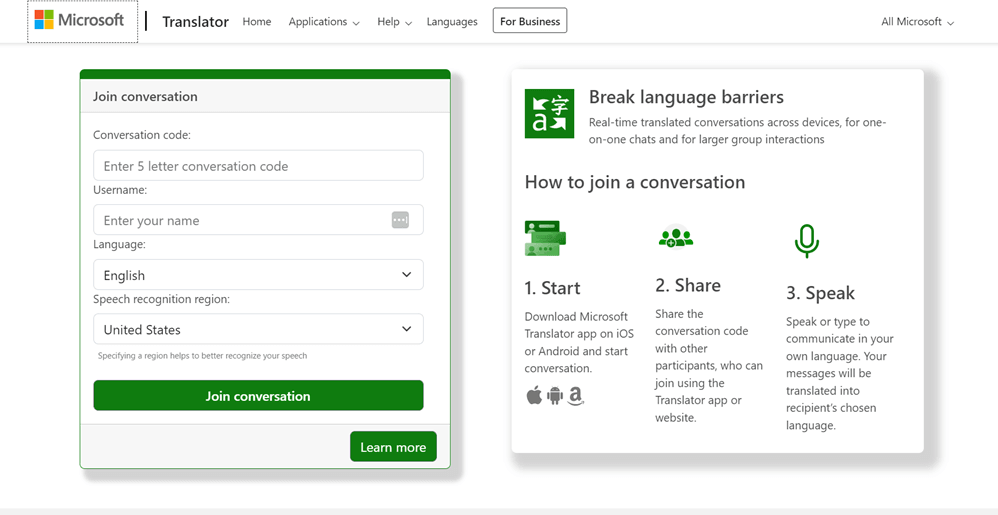
Microsoft Translator provides a variety of tools and applications focused on the general user. Microsoft Translator currently supports 129 languages, which is the highest number in this shortlist. While almost comparable to Google Translate, it’s a lot bigger than what DeepL offers.
The main advantage of Microsoft Translator compared to Google Translate is the cost aspect. If you plan to translate a website or app, Microsoft Translator provides more abundant free tiers and is also more economical if you need paid translation options.
In simple terms, the price advantages of the Microsoft Translator API include:
- Four times the capacity of monthly subtitles on the free tier.
- A paid translation fee that is half the cost of Google Translate.
- What’s more, Microsoft Translator offers additional discounts when the volume of words on order increases.
However, there are two main disadvantages of Microsoft Translator compared to Google Translate:
- Google Translate supports a few additional languages, although this may or may not be very relevant depending on the language pair you need, especially since the differences are relatively small.
- Most people tend to find translations from Google Translate a bit better than Microsoft Translator, this can be seen from the DeepL translation study above.
Overall, Microsoft Translator can be a good choice if you’re looking to cut costs, but still provide several advantages over Google Translate beyond price.
3. Amazon Translate
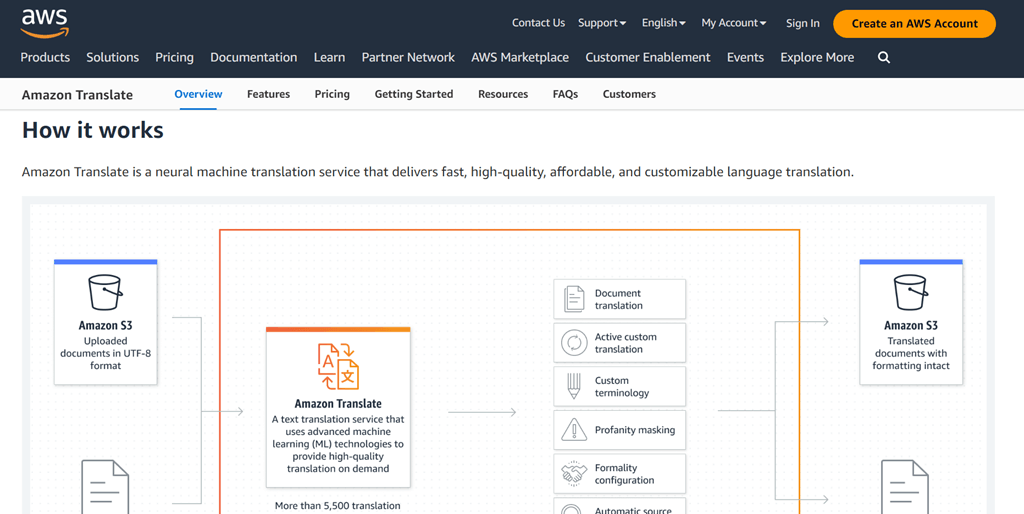
Amazon Translate, an integral component of Amazon Web Services, is a machine translation solution. Unlike previous tools that encompass translation apps, user interfaces, and translation APIs, Amazon Translate is primarily tailored towards API utilization.
This signifies that while it can facilitate translation for your application or website. At present, Amazon Translate extends support to over 75 languages. Although this is fewer than what Google Translate or Microsoft Translator provide, it surpasses DeepL’s offerings.
Comparable to Microsoft Translator, Amazon Translate holds an edge over Google Translate in terms of pricing.
To begin with, the no-cost tier of Amazon Translate permits a larger monthly limit in contrast to Google Translate:
However, the free tier of Amazon Translate remains active for only 12 months; it lacks the lifetime validity of Google Translate’s free tier. Consequently, if your translation requirements extend beyond a year, this could be a factor to contemplate.
For those necessitating the premium tier, Amazon Translate is more budget-friendly compared to Google Translate, though not as economical as Microsoft Translator:
- Amazon Translate API incurs a fee of $15 for every one million translated characters.
- Google Translate API, on the other hand, charges $20 for every one million translated characters.
4. Yandex Translate

Yandex Translate is the machine translation solution developed by the Russian search giant, Yandex. It provides support for over 98 languages, which is quite impressive, although it doesn’t match the comprehensiveness of Google entirely. If you’re curious about how Yandex Translate compares directly to Google Translate, you can explore a detailed comparison in this guide on Yandex Translate vs. Google Translate.
Similar to Google Translate, it offers user-oriented applications (such as a web-based translation interface) alongside a translation API for automated website translation. Given its origin in a Russian company, Yandex Translate is particularly well-suited for handling translations involving Russian language pairs.
The most significant advantage of Yandex Translate lies in its remarkably economical pricing, especially when compared to other translation services. The cost for translation is a flat rate of $3.9376 per one million characters, which is merely one-fifth of Google Translate’s price. Regarding pricing, Yandex provides an attractive proposition compared to Google Translate, though not as enticing as Microsoft. The standard rate per million characters initiates at $15 for orders up to 50,000,000 characters. As the volume escalates, the cost per character drops substantially. For instance, if you require translation within the range of 500,000,001 to 1,000,000,000 characters per month, the fee is merely $6 per million characters.
5. Google Cloud Translation AI
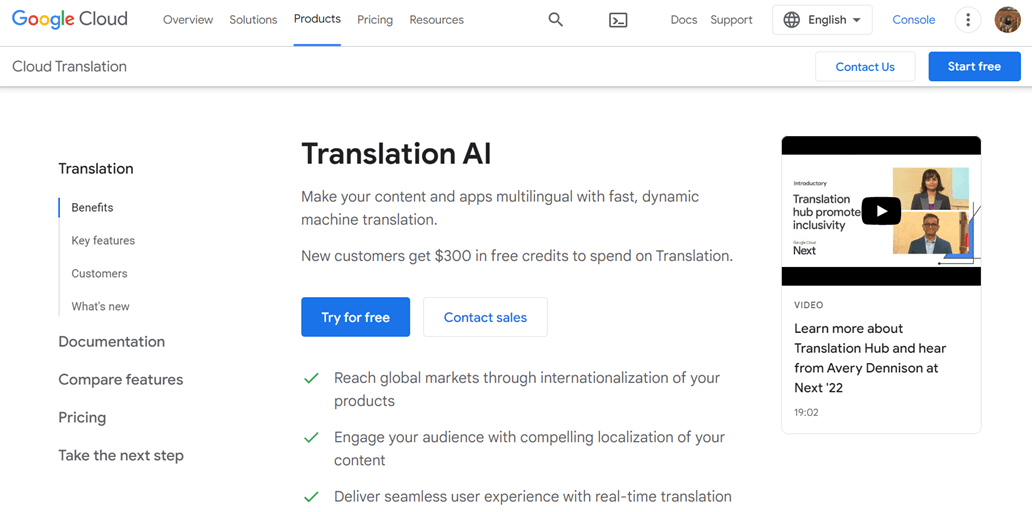
Google Cloud Translation AI is an automated translation service provided by Google Cloud Platform. It is a tool used to automatically translate text or content from one language to another using artificial intelligence (AI) technology.
This service is designed for use by developers and organizations in a variety of contexts, such as translating website content, applications, documents, and more.
Google Cloud Translation AI enables customers to adopt and train a translation model that is tailored to the language and style used in their domain. This allows for translation results that are more suitable and consistent with a particular brand or need.
These services are designed for larger scale and used in more complex business and application scenarios. It is suitable for companies that have large or regular translation needs.
However, keep in mind that Google Cloud Translation AI is a paid service and requires some understanding of technical development and configuration. It is better suited for developers or organizations that have specific needs regarding translation and the ability to manage the necessary technical integrations.
The price offered by Google Cloud Translation AI starts from $ 20 per 1 million characters while the usage reaches 500,000 to 1 billion characters per month.
Those are some alternatives to Google Translate that can be used to translate websites. All of these services provide APIs that can be integrated into websites so they can translate automatically.
6. Reverso
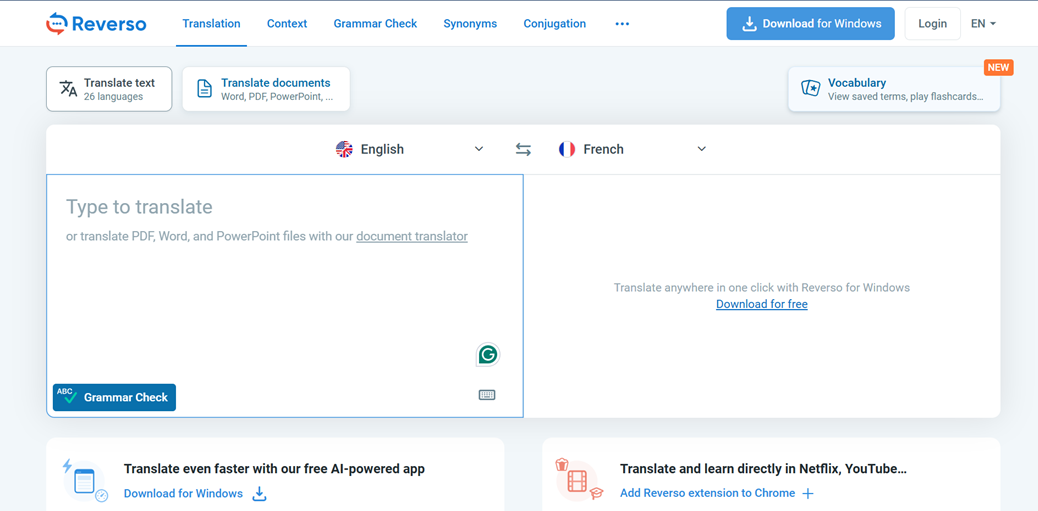
Reverso is an AI-based translation tool that supports over 15 languages for text and over 25 languages for documents. The service is available through a website, apps on various platforms such as Mac, Windows, iOS, and Android, and browser extensions for Chrome and Firefox.
Its top features include a grammar checker that automatically corrects errors in the original text to produce high-quality translations. In addition, Reverso’s built-in dictionary allows users to customize translations with synonyms and examples of word usage in relevant contexts, making it more than just a translation tool.
While free, there are limits to the number of words and characters that can be overcome with a Reverso Premium subscription, starting at €6.49 per month. Subscriptions allow access to features such as text translation of up to 8,000 characters at a time, translation of up to 50,000 words per year, and translation of scanned documents. With these features, Reverso is an attractive alternative to Google Translate, especially for users who want more accurate and contextual translations.
7. IBM Watson Language Translator
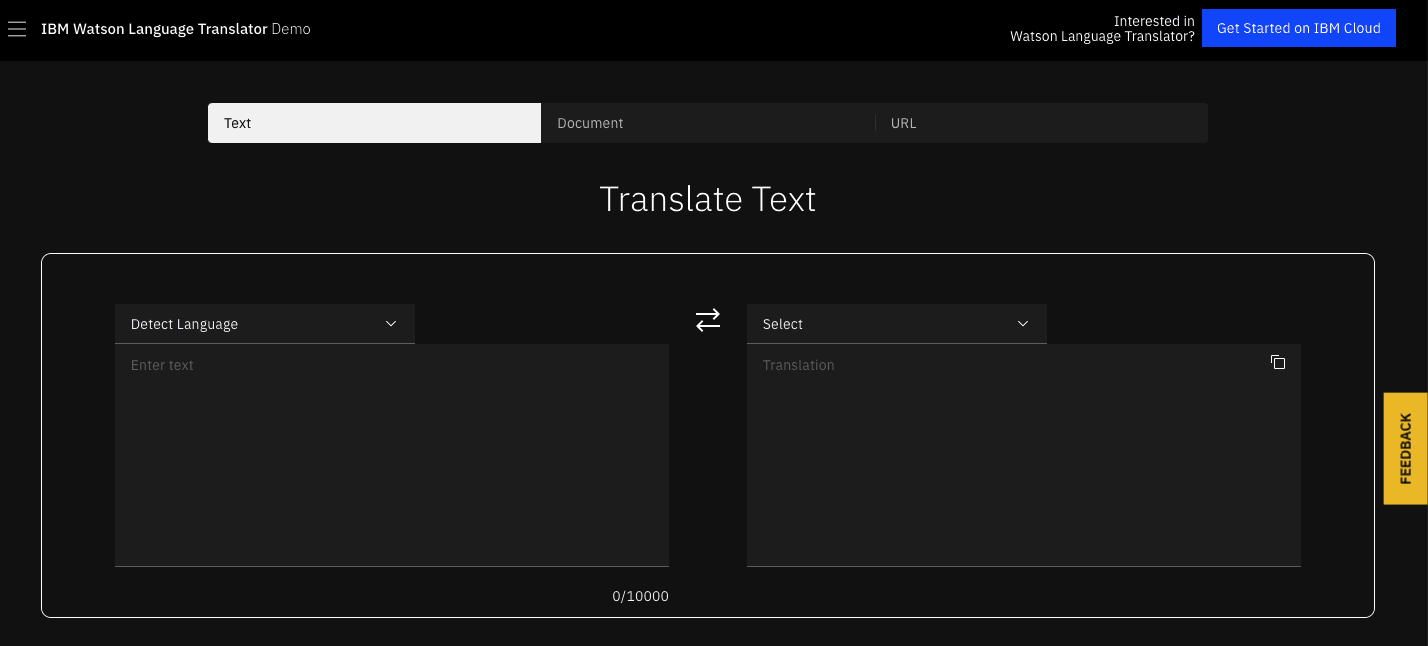
IBM Watson® Language Translator is an AI-based translation tool that can automatically recognize and translate languages into other languages, supporting various needs, including documents. Besides using the built-in translation models, you can also customize these models for specific needs.
IBM Watson Language Translator’s strength lies in its ability to create customized translation models tailored to specific industry terminology, such as medical, legal, or technology. This makes the translation more relevant and contextual to your needs.
Compared to tools like Google Translate, IBM Watson Language Translator offers advantages in terms of personalization and integration. It can be integrated into applications or systems via APIs, enabling efficient automated translation in everyday work processes.
8. AIPal
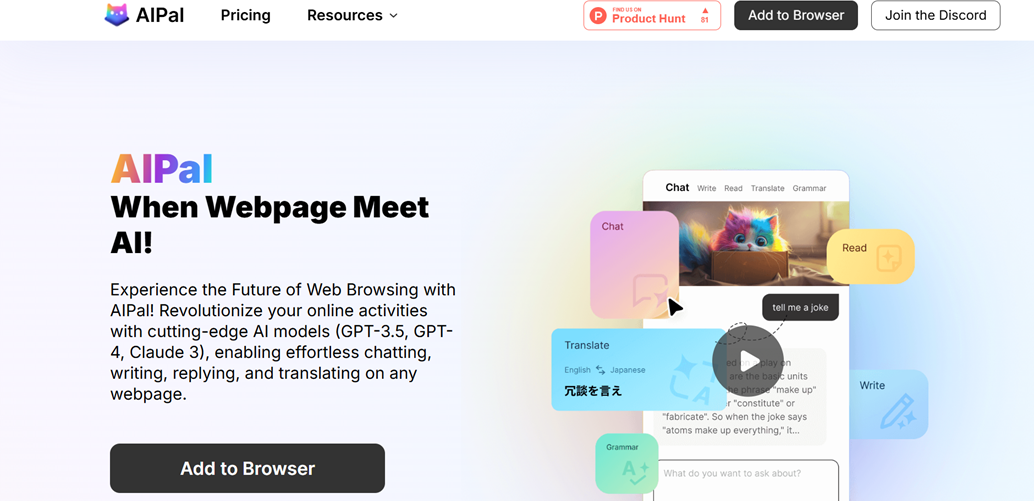
If you want to translate websites using an easy Chrome extension, AIPal can be one of the solutions. Not only does it make daily activities easier, but it can perform various functions without the need to switch tabs. One of its best features is the ability to translate entire web pages.
AIPal supports translating various text types, from privacy policies to informative articles. It also integrates with major translation services such as Google, Microsoft, Yandex, and Tencent, providing an experience on par with Google Translate.
AIPal works very simply. Once installed as a Chrome extension, the tool will always be available on the right side of your screen, ready to use at any time. With this convenience, AIPal is an interesting alternative to Google Translate, especially for users who need a quick translation tool without the hassle of switching platforms.
Apart from those mentioned above, you can also use a translation plugin as an alternative to Google Translate. As we know there are many types of translation plugins available and they offer many interesting features.
Linguise: Best alternative to Google Translate for websites translation

One of the best translation plugin is Linguise. Linguise is an automated translation solution seamlessly integrated with diverse content management systems like WordPress, Joomla, and other CMS platforms.
Leveraging neural network technology, Linguise delivers translation outcomes that closely resemble human translations. As a result, it not only ensures rapid translations but also generates more organic and authentic renditions.
Furthermore, Linguise presents an array of compelling functionalities designed to enhance the translation process. These include a real-time front-end editor, translation exclusion capability, and a variety of other features. For individuals intrigued by its potential, Linguise provides the opportunity to explore its offerings through a complimentary one-month trial version.
The Linguise plugin provides over 80 languages, although not as many as other platforms but you are free to add any language to your site. In addition, Linguise has also used neural network technology to produce translations that are as natural as human translation.
Linguise feature for alternative to Google Translate
- Linguise front-end live editor: Linguise incorporates a front-end live editing tool, enabling direct modification of translation outcomes directly on the website’s front page. This convenient functionality is easily accessible through the Linguise dashboard.
- Possibility to add translators: to achieve immaculate translation results, the option exists to collaborate with translators proficient in various languages. You possess the capability to add these translators to your website, facilitating seamless teamwork.
- Multilingual SEO: Linguise negates the need to grapple with SEO concerns. This aspect holds special significance for multilingual websites, as they bear the responsibility of translating all website components into the chosen language while maintaining optimal SEO. Fortunately, Linguise adeptly addresses this issue upon plugin installation and activation. It encompasses diverse aspects such as Hreflang generation, alternative URLs, canonicals, and XML sitemaps.
- Translation exclusion rules: beyond its direct editing capabilities, Linguise also furnishes the ability to exclude certain content from translation. The inclusion feature retains the originality of translated words or phrases. To access these functionalities, one can navigate to the Linguise dashboard and select the Rules menu.
- Filter translation: filter translation is a Linguise feature that makes it easier for you to filter the results of your translation. You can filter the results by language, date, and the original text.
Conclusion
Now you know what are the alternatives to Google Translate for website translation, from DeepL to AIPal.
If you’re looking for a more full-featured solution, you can use the Linguise plugin that can be easily installed on your site. The Linguise plugin is free to use for a 1-month trial. After that, you can subscribe Linguise to enjoy more features and translate more words.

